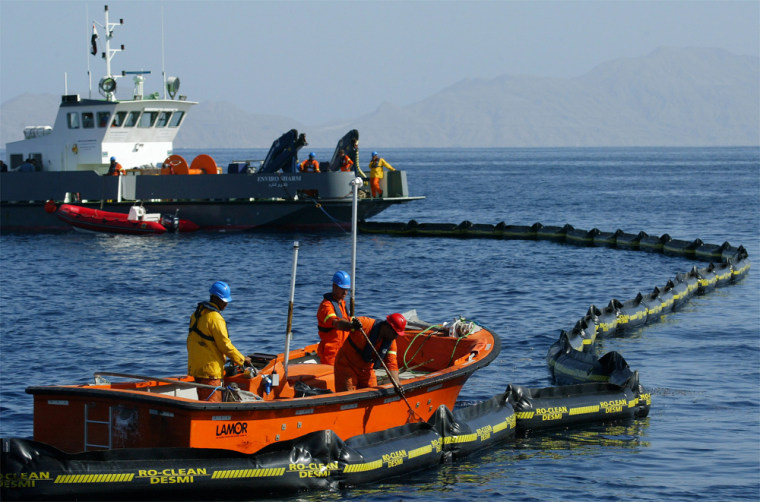Searchers hunting for the wreckage of an airliner zeroed in on a signal late Monday that could be the black box — holding clues to the cause of the Red Sea crash that killed all 148 people aboard, a French embassy official said.
The U.S. State Department, meanwhile, said four people with dual U.S.-Egyptian citizenship were among the dead, the first word that Americans were on the Flash Airlines flight, which was bound for Paris via Cairo. Most of the passengers were French tourists.
The plane — an 11-year-old Boeing 737 operated by the private Cairo-based carrier — crashed shortly after takeoff Saturday from this popular Red Sea resort.
The crash coincided with heightened concern about terrorism in the skies, but Egypt quickly ruled out the possibility of an attack, saying the crash was an accident caused by a mechanical failure.
At the same time Egyptian officials said they did not yet know the nature of the mechanical problem, adding that jet checked out fine before the flight.
Michel Wachenheim, head of France’s Civil Aviation Authority, said Monday night he couldn’t rule out terrorism.
“We have no information concerning the cause of this accident, and until we have the flight recorder, we won’t know,” he said. “We cannot exclude either an accident or a criminal cause.”
France’s top aviation official said while the crash appeared to be an accident, he couldn’t rule out the possibility of terrorism.
No burns
Body parts recovered from the sea so far bore no burns, suggesting there was no explosion, French Deputy Foreign Minister Renaud Muselier said Monday.
“There is no reason to believe there was an attack,” Muselier told France-Info radio.
A signal that could be the plane’s black box was detected late Monday by radar on a robotic arm used by searchers at the crash scene, a French Embassy official said. The official, who declined to be named, called the signal a positive development and said the search would resume Tuesday morning.
While disclosing that four Americans were aboard, U.S. State Department spokesman Adam Ereli said he had no further details as to who they were or what their occupations might be.
As the country where the plane was made, the United States was sending a team of investigators to the scene, including experts from Boeing.
France has sent in advanced military equipment to help find wreckage and remains, as well as forensics experts to identify body parts through DNA testing.
A French military plane equipped with radar took its first surveillance flight over the area Monday, and a team of 16 French military divers was to begin work on Tuesday.
“We’re trying to work as fast as possible, as efficiently as possible on both sides, because we know the families of victims want results,” said Jean-Claude Cousseran, the French ambassador to Egypt.
Families of the victims were to begin arriving Wednesday in Sharm el-Sheik, about 480 miles southeast of Cairo, for memorial services on land and on sea.
The aircraft was one of two Boeing 737s operated by Flash.
The Swiss Federal Office for Civil Aviation disclosed Sunday that it had found problems in one of the aircraft in October 2002. On Monday it said it had found similar flaws in the other plane six months earlier.
The chairman of Flash Airlines, Mohamed Nour, has said his company made necessary improvements and later passed Swiss inspection — but the Swiss have denied this.
In 2003, Switzerland informed France of its concerns, and French authorities carried out three checks, obtaining satisfying results, French Transport Minister Gilles de Robien said.
Reports of violations
France’s Civil Aviation Authority said Flash was inspected seven times in two years in Europe: twice in Switzerland and once in Norway in 2002, and three times in France and once in Poland in 2003.
A former flight attendant for the carrier Swiss International Airlines was quoted Monday as saying he noticed several safety violations as a passenger on a Flash Airlines flight from Zurich to Sharm el-Sheik.
In an interview published in the Swiss daily Le Matin, Robert Oesch, 36, said the pilots, for example, were walking around the plane while it was on autopilot and some of the cockpit instruments were not working.
The flight occurred about two weeks before an engine caught fire during a Flash Airlines flight from Sharm el-Sheik to Bologna, Italy, on Oct. 27, 2002.
Oesch told the paper the flight was delayed for eight hours while it was checked out.
“I agreed to get on board only because I was convinced that the inspectors had checked everything out carefully, but I admit that I was frightened throughout the flight,” Oesch told Le Matin.
Flash Airlines said Monday it has suspended flights for three days in mourning for the victims.
Germany’s civil aviation authority put Flash Airlines’ flying rights under review as a precautionary measure in light of the crash.
